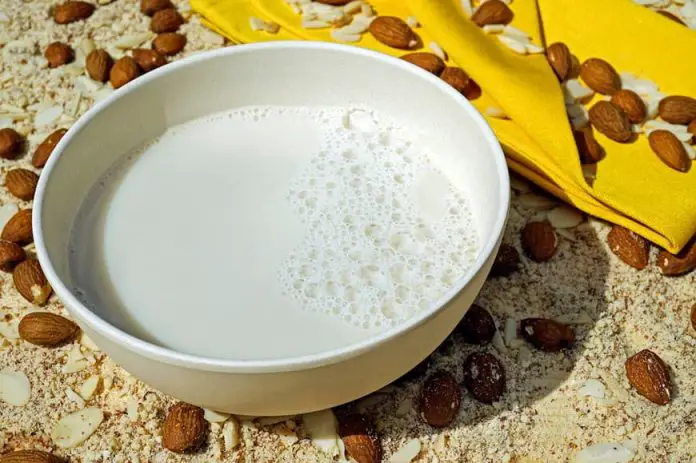There is an ongoing debate whether dogs can have milk or not. Pet authorities, like the American Society for the Prevention of Cruelty to Animals, do not recommend giving milk to canines as they do not have the adequate enzymes to break down the lactose. Most canines become lactose intolerant after puppy-hood.
But to be completely honest, I have never met a dog owner who claimed they never ever gave milk to their pet. Most of the stories I heard were about dogs which love milk and drink it regularly without experiencing diarrhea afterward. Isn’t that quite ironic?
This brought me to the idea of giving almond milk to my own pooch. I asked myself “Is almond milk good for them since it is naturally free from lactose?” It is plant milk so basically, it is easier to digest than dairy milk. With that in mind, I assumed almond milk to be a healthy treat for my puppy.
CHECK LATEST PRICE OF DOG CAMERA
Amazon.com
I kept reading and reading until my impression about almond milk somehow changed. I joined dog forums and got some insight from other dog owners. I learned so many important things about almond milk for puppies, which I want to share with you.
Can Dogs Have Almond Milk?
Here are just a few things I realized and helped me decide it’s best I skipped on giving my dog almond milk:
1. Almond milk is quite costly.
Owning a dog is costing a lot. There’s the food, regular checkups, grooming, tick or flea prevention, health insurance, and so on. If you add almond milk to your pet’s diet, that means an additional expense. Let’s admit it, we love our dogs and we want to give them the best of everything. On the other hand, we also need to be practical because we also have other things to think about.
A 32-ounce almond milk costs around $2-$5 in supermarkets. Premium brands, such as an Aussie brand of almond milk with 12% almond concentration costs $10 for one litre. If this is the case, should you make your own almond milk instead? DIY almond milk is actually easy to make. Pulverize the almonds, add some water, and strain it.
Homemade almond milk can save you a bit but the total cost will still depend on the current price of almonds. These nuts usually cost around $4 per pound. Almond is expensive because it takes time and effort to cultivate.
When you are a practical dog owner, adding almond milk to your puppy’s diet may not be a wise decision. Now, what if you actually give your dog almond milk and he suffered diarrhea because of it? That means you have to bring him to his vet and pay for medical expenses. When your puppy is not among the lucky ones who can easily digest milk, better skip the almond milk.
2. Milk and nuts are not naturally part of canines’ diet.
Truth is our furry friends can survive without milk. Even puppies only need it shortly after birth. Pups should drink milk from their moms. But if that is impossible, in case that the mother is not lactating or absent, the best kind of milk is a formula specially designed for puppies. Don’t settle for any kind of milk for a newborn puppy, because his tummy is sensitive.
If you are thinking of giving almond milk to your weaning puppy, just opt for raw goat’s milk instead. It is easier to digest than any other type of milk. Also, compared to almond milk, it contains more vital nutrients for growing dogs.
Apparently, almond milk is lactose-free, but it is still made of nuts that are not really recommended for canines. Most vets would say almond milk is fine as long as it is unsweetened. However, that “unsweetened” term can be misleading. There are brands of almond milk claiming the product is unsweetened, when in truth, it contains lots of additives or fillers.
There’s this brand that makes unsweetened almond milk with zero percent sugar but it still uses preservatives and the product only contains 2% almonds. Milk with more sugar and less almond won’t do your pet any good.
3. It may contain ingredients that can harm your dog.
Some brands of store-bought almond milk are not as wholesome as you think. Certain brands are loaded with sugar and additives. Almond milk usually comes in different flavours. Some manufacturers add vanilla or chocolate to make the milk taste better.
Aside from additives, some almond milk may contain harmful ingredients for your dog.
Here are some ingredients to watch out for:
- Carrageenan – derived from seaweed, this is commonly used to thicken certain moist food products. According to a report by the Cornucopia Institute, this food additive may cause gastrointestinal inflammation. When prolonged, the inflammation serves as a predecessor to more serious conditions such as cancer. It is commonly used in dairy products and dairy alternatives like soy milk, coconut milk, and almond milk.
- Chocolate – this is one of the top foods to avoid because it can be toxic for canines. Chocolates contain theobromine, a component that we humans can easily digest but our dogs can’t. Did you know that even a small serving of chocolate can cause your pooch to have digestive issues? Almost all almond milk brands already have a chocolate-flavored version.
- Gums – food manufacturers use certain gums, such as guar gum, gellan gum, and locust bean gum as thickeners. Although generally safe for pets, they can still cause diarrhea.
- Xylitol – when buying almond milk, make sure it does not have artificial sweeteners like xylitol. Often used as a substitute for sugar, xylitol can be toxic to canines because it can quickly get into their bloodstream and release insulin from their pancreas. This can decrease their blood sugar level in as fast as 10 minutes. The hypoglycemia can mean life or death to your canine.
3. Almond milk can make your dog fat.
Almond milk is all the rage these days, especially for health-conscious individuals. Many people use it as an alternative to dairy milk because of the less-sugar and less-calorie content.
But just because it does not have as many calories as dairy milk does not mean it is free from fat. All nuts contain fats, and almonds are not an exception. Processed milk may contain heaps of calories and fats your pooch does not need. The high fat in almonds can cause diabetes mellitus and obesity. When your dog already has weight problems, it may not help to add almond milk to his diet.
Canine obesity is a serious issue. The almond nut itself is not a safe bet for dogs because it is high in fat that can put your pet at risk of having pancreatitis.
If you are after the protein content of almonds, just go for safer and healthier food choices. The best protein foods for dogs include cheese, real meat like chicken and turkey, as well as other lean meats.
Plant-based proteins are the worst kinds of proteins for canines. The best types of protein for our pets are the ones that have the same spectrum of essential amino acids that real meats have, which is not the case for the plant-based ones.
5. Almond milk is not nutrient-dense.
This is the most surprising fact I learned about almond milk. Almonds, in their nut form, are rich in protein. Almond milk, however, is another story as the nutrients from the nuts have already been filtered. Dietician Jo-Ann Jolly told Time that the process of straining the almond can leave it with more additives, thus removing the nutrients from the nut.
Take note that commercially produced almond milk has already undergone a filtration process. Add the fact that their almond milk only contains less than 2% of vitamins and mineral blend.
A certain brand of almond milk has as much as 7 grams of sugar per cup. That’s a lot! I found some that even have more sugar than that. Unfortunately, many brands make almond milk with high sugar content and low almond concentration. That is something you, yourself, should not drink or add to your children’s cereal if you are after a healthier lifestyle.
Key Takeaways
The verdict: almond is safe for dogs but it is not the best option for them. A little almond milk for your dog would not hurt but it is not recommended to give your dog milk, on regular basis even if it is a dairy alternative.
If you want to save money and be truly practical, just skip the almond milk. Look for staples that will truly benefit your dog. Save that almond milk for your own smoothie or baked goodies. Your dog can get along just fine without any kind of milk in his diet.
Most importantly, it is good to read the labels before giving anything to our pets. Use the reference above to see which ingredients to avoid. Have you given almond milk to your pet before? How was the experience?























